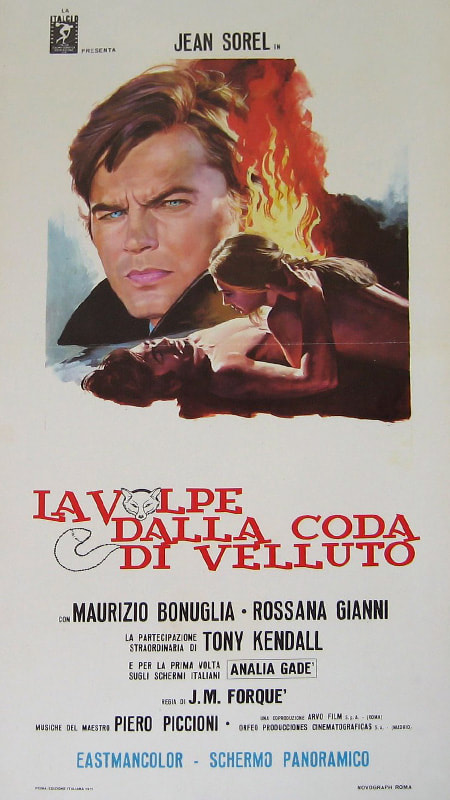Trapped in a volatile marriage, Ruth finally spies a way out for good when she meets Paul, a dashing younger man. Given that he's played by Jean Sorel, Paul isn't necessarily all he's cracked up to be, however. He quickly makes himself at home in Ruth's seaside mansion, and, after Ruth narrowly survives a couple of unlikely 'accidents', her soon-to-be-ex-husband pops in for a visit. With a mysterious blonde woman looking on from a rented villa next door, and Roland, Paul's old friend from Vietnam, also lounging around like a character from a Jess Franco film, will Ruth emerge unscathed from the eye of the hurricane, or will she choke on the fox's velvet tail?
For a film that's 100 minutes long and features absolutely no blood-or onscreen killings-this is pleasingly engaging stuff. It toys with the viewer slightly, with the initial mystery seeming to concern the motives of Jean Sorel, which, as any giallo fan will tell you, tend to be nefarious. Just as you're beginning to think that you have the film all worked out, and pitying it for its naivete, it shows its hand completely, telling you exactly who is trying to do what to whom. This occurs pretty much halfway through, and the remainder of the film is a continual series of twists and turns, some of which are obvious, but even that sometimes seems to be deliberate, so as to obfuscate the build up to further, less obvious surprises.
The film largely takes place in a single location, a Franco-esque seaside villa, and, as is common in this sort of giallo, there are very few characters. The reasonably clever plot mightn't be enough for the more gore-hungry fans out there, but it should satisfy the more cerebral cineaste. The performances are all decent, with Sorel doing his patented smarmy cad routine which would've been so familiar by this stage that elements of it must have slipped into his real life persona. Analía Gadé, playing Ruth, seems to have declined to do any front-on nudity, but acceded to offering a rear view. The small print of the contract seemingly didn't put a limit on the amount of rear nudity she'd do, however, and José María Forqué takes every opportunity, and shoehorns in a few non-opportunities, to showcase her rear in all its glory. There's also a delightfully cheesy early sequence in which she's topless, but her wares are obscured by a succession of inanimate objects; the end result cannot fail but to bring Austin Powers to mind.
One iffy point is the attitude of the police, who (mercifully, given their evident lack of prowess) play a very minor role in proceedings. There's always a chance that an eventual court case will alter/correct the events of the final reel, but part of the process of buying into a film is the rejection of such notions, unless expressly signposted as a possibility by the director. Here, the police have clearly stumbled into a messy domestic situation, and any fool could see that there's some blackmail action happening. A realisation of this might've given them pause for thought in their interpretation of the circumstances surrounding the death of a leading character, but they seem happy to take said circumstances at (apparent) face value. As I said, the film concludes with arrests, which are by definition not definitive judgements, rather than deaths, and there's no doubt that everything feels narratively satisfying. It's just a shame it doesn't feel true-to-life.
|
|
The final shot, after the aforementioned arrests, is somewhat open to interpretation. We get a seemingly neat, happy resolution, but the final shot recalls an earlier anecdote about patient lions stalking prey, and we wonder if the tale is about to repeat itself in real life. Or, are we seeing the beginnings of a beautiful friendship, with the prey being happiness and companionship, rather than easy money? Who knows (probably the former, though). The credits sequences are also somewhat noteworthy, with the opening being an animation along the lines of a spaghetti western-Saul Bass hybrid (detailing a white swan transforming into a black one, among other things; Ruth is also given a pet swan by Paul, so maybe the person who came up with the Italian title wasn't good with animals and confused swans with foxes). The credits, both opening and closing, are far more detailed than is usual, which may have been coming from the Spanish end of things. And, if the promise of thorough credits doesn't give you the final nudge into taking a chance on this one, I don't know what will.
|

 RSS Feed
RSS Feed
